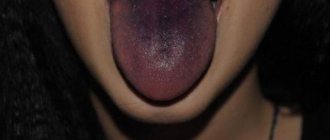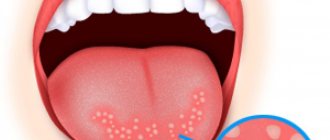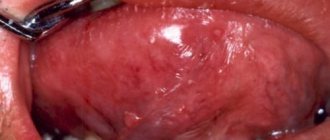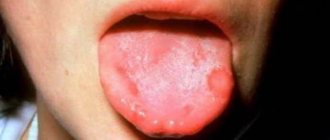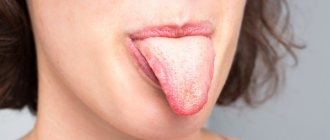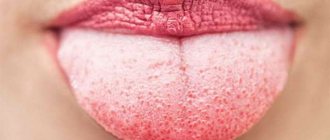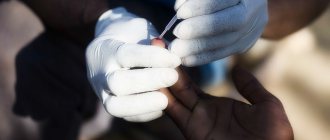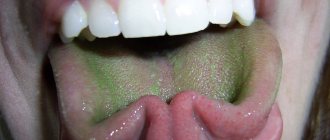Tongue traumatism: theory
Before you begin treatment of the tongue, you should carefully study the nature of the injury and its causes.
Mechanical impact
The first type of damage - mechanical - is the most common cause of tongue injuries. Due to mechanical damage, ulcers and superficial erosions form on the tongue.
Conditions under which mechanical injuries occur are of a domestic nature:
- damage to the integument by dental instruments - probe, bur, disc;
- the occurrence of a wound under the influence of a sharp object - a bone, a knife, a fork;
- biting the tongue while eating, epileptic seizure;
- the appearance of tongue injuries from blows to the face.
Healing of a wound caused by mechanical impact occurs depending on the depth and area of damage to the mucous membrane.
Chemical burn
Chemical injury to the tongue, as the second type of injury, occurs due to contact with the mucous membrane of a chemical substance of an acidic or alkaline nature.
Under the influence of an irritant, chemical burns occur on the tongue. The latter are characterized by the appearance of dark-colored areas, scars, blisters and blisters on the tongue (in severe cases).
Instant rinsing of the mouth with solutions with neutralizing properties is the key to rapid restoration of the integument.
For chemical burns, it is preferable to seek help from medical institutions.
Painful influence from the outside
Damage to the mucous membrane by steam, hot water, fire, electric current or ionizing radiation is called physical trauma to the tongue.
Characteristic of this type of injury is pain that gradually subsides from the moment of injury.
The main danger of physical injury is the development of acute catarrhal glossitis (inflammation). Consultation with a doctor in complex stages of injury is mandatory.
Deep damage to the tongue caused by various kinds of external irritants can be accompanied by complications: abscess or phlegmon of the tongue.
Painful swelling and accompanying difficulties with swallowing and speaking are symptoms of an abscess. In later stages, with increasing inflammation of the tongue, the abscess turns into phlegmon. The victim requires emergency hospitalization and surgical intervention.
Tongue with teeth marks around the edges
According to most doctors, dental imprints can remain due to the following reasons:
- the bite is not formed correctly;
- the person is constantly in a state of nervous breakdown;
- inflammatory disease glossitis has developed;
- there was a malfunction in the gastrointestinal tract system;
- congenital curvature of the tongue.
It is important to remember that doctors never make a final diagnosis based on one symptom, but only by taking them into account together. Localization of prints can be located in different parts of the tongue. It is their location that indicates a particular disease. There are patients who have teeth marks along the edges of the tongue, while others have them near the root.
Typically, visible marks may result from swelling. It is caused by allergic reactions or mechanical injuries. In these cases, there are no serious reasons for examination. However, this can also be a manifestation of other diseases. Let's take a look at each reason in more detail.
Treatment Basics
As mentioned earlier, treatment for tongue injuries depends on the nature of the injury. While a home first aid kit is sufficient to heal superficial injuries, eliminating the consequences of traumatic factors in case of serious injuries requires, first of all, consultation with a doctor who will select the necessary medications and prescribe recommended procedures.
What to do depending on the type of injury:
- The standard method of treatment or initial treatment of mechanical injuries is the use of antiseptics (alcohol, iodine, brilliant green). Rinsing with disinfectants helps in restoring the mucous membrane: furatsilin, hydrogen peroxide, potassium permanganate dissolved in water in a ratio of 1 to 3000 or baking soda at the rate of 1 teaspoon per 250 ml. Do not neglect plant decoctions with calming properties.
- Knowledge of chemical neutralizing reactions will be useful in case of chemical burns , because the “golden rule” of first aid for this is as follows: rinse with a neutralizing solution. Timely implementation of the necessary procedures will avoid further treatment. Blisters appearing on the tongue indicate severe damage. Opening of formations with subsequent processing should only be carried out by specialists. After neutralizing the blisters, doctors most often prescribe rinsing the mouth with disinfectants.
- Profusely bleeding wounds require immediate tamponade. It is unacceptable to independently remove foreign bodies from ulcers.
Burning sensation on tongue
Burning sensation on tongue
With dental imprints, additional symptoms often appear. Most often, patients complain of a burning sensation. This symptom always accompanies swelling of the tongue. If the organ increases in size, then the appearance of marks on it is diagnosed.
We suggest you read: Rinse with baking soda after tooth extraction
The occurrence of pathology is often diagnosed with injuries to a muscle organ if a person constantly bites it while eating. In this case, the appearance of dents is observed on one side of the organ. The disease occurs when there is a malfunction of the thyroid gland. In case of hormonal imbalances, long-term treatment is recommended.
The disease occurs in people who have had their dentures installed incorrectly. Pathology appears during the course of an infectious process in the body. In this case, a white coating appears on the tongue. Pathology is diagnosed in anemic conditions.
It also occurs during the development of bite problems. If an oncological process occurs in the human body, this can lead to swelling of the tongue. If a person has a tongue piercing, the organ may become swollen.
This is the most harmless reason that goes away on its own.
Read: Atresia and synechia of the nasal cavity
If the organ is swollen, you should not self-medicate. In this case, various complications may arise. The most difficult of these is suffocation. To eliminate the symptoms of the disease, it is recommended to take anti-inflammatory and painkillers. Patients are also prescribed specific therapy that can eliminate the cause of the pathology.
Burning and indentations in the tongue are a serious symptom of various pathological conditions that are strictly forbidden to be ignored.
Biting your tongue - everyone knows this
Biting the tongue, cheek or lip is accompanied by painful sensations, as damage to the mucous membrane occurs.
Obviously, the initial goal after a bite is to reduce pain. So, what should you do if you bite your tongue, what and how to relieve pain and inflammation?
The main rule is to remain calm. Calm down and try to come to terms with the pain, because tantrums and tears will not help heal the damage.
And then you should do the following:
- Be sure to stop bleeding , if any. An elementary solution would be to repeatedly rinse with cold water: it will help narrow the blood vessels and reduce bleeding activity. A worthy alternative would be a piece of ice.
- Cotton swabs soaked in 2% Lidocaine help in the fight against painful sensations . Another variation to reduce pain is eye drops with an anesthetic - Tetracaine, Alcaine.
- It is important to disinfect the entire oral cavity : brush your teeth thoroughly and rinse your mouth.
- Maintain regular rinsing : it is advisable to wash away the remains of eaten food after each meal.
- Use antiseptics such as Antiangin, Trachisan, Furacilin in the form that is optimal for you: spray, lozenge or solution.
- Avoid eating rough, cold or hot foods . During the restoration of the oral mucosa, it is advisable to create a daily menu of liquid soft foods at medium temperature: purees, soups.
- Avoid cold foods - ice cream, frozen juice and other foods with temperatures below zero - they slow down the healing process.
- Take a course of vitamins to help restore damaged areas. The optimal solution would be to include vitamin C and group B in the diet.
Do not forget to adhere to sanitary and hygienic measures: do not reach into the oral cavity with dirty hands, do not put pressure on the resulting injury.
Never pour iodine or brilliant green or peroxide into a wound: give preference to treating the environment around the injury. Antibiotics can only be used as prescribed by a doctor.
Prevention of tongue diseases
The best defense against tongue disease is prevention. Pay attention to oral hygiene, use only brushes with soft bristles and change them at least once every three months. Clean your tongue from plaque using a special attachment or spatula. If there are no complaints, it is recommended to visit the dentist at least once a year, and at the first signs of problems in the body, do not delay going to a specialist.
We suggest you read: Tongue coated with white coating causes treatment - Pain in the intestines
The best defense against tongue disease is prevention. Pay attention to oral hygiene, use only brushes with soft bristles and change them at least once every three months. Clean your tongue from plaque without using a special attachment or spatula. If there are no complaints, it is recommended to visit the dentist at least once a year, and at the first sign of problems in the body, do not delay going to a qualified worker.
When the thyroid gland produces insufficient levels of essential hormones, hypothyroidism begins to develop.
At the first stages there are no obvious symptoms of the disease. But at the time of progression, signs such as:
- Swelling of the facial muscles.
- Swelling of the mucous membranes.
- Alopecia (hair loss).
- Provoked inhibition of the speech apparatus, impaired diction.
- Voice change.
- Imprints of chewing teeth on the tongue.
Getting rid of hypothyroidism is carried out by an endocrinologist, performing the accepted therapy to normalize the patient’s hormone levels.
Pellagra is a subtype of vitamin deficiency disorder, which manifests itself due to an unbalanced diet and deficiency of vitamin PP, as well as proteins and the required number of amino acids. During which the patient experiences: intense excitability, dysfunction of the nervous system, obvious dementia, limb paralysis, rapid baldness, dermatitis, diarrhea and glossitis.
If glossitis is detected during pellagra, then teeth marks can be easily traced on the swollen tongue. Often this disease affects people of a socially unstable level - with low income and a drunken lifestyle.
It is important to complete full treatment to avoid death.
Traditional medicine at the service of the people
Here is a selection of recipes for solutions, the use of which will help disinfect, heal wounds and reduce pain:
- A decoction of bedstraw helps to cope with tongue pain . Brew 1 tablespoon of dried herb with boiling water, leave for half an hour, strain the resulting mixture. The decoction is suitable for both rinsing and internal use.
- Sage tincture is an assistant in the fight against pain during the treatment of oral injuries. By brewing 2 tablespoons of the substance with half a liter of boiling water and letting the infusion “rest” for 30 minutes, you will get an excellent antimicrobial and anti-inflammatory medicinal drug. Rinse frequency: 5-11 times a day.
- Pour 1 tablespoon of chamomile 250 ml of boiling water and let it brew. Use the strained solution after meals and before bed to heal wounds and relieve inflammation.
- St. John's wort tincture is a panacea for pain caused by a tongue injury. Use 40% alcohol and dried herb in a ratio of 5 to 1, respectively. Add 30-40 drops to 250 ml of water and rinse your mouth.
- Finding potatoes in a cellar or drawer is not difficult, but peeling them is a matter of two minutes. Feel free to use sliced raw vegetables to relieve pain from burns.
Read also: Chamomile for toothache
Treatment with home remedies
When treating edema, various home remedies that happen to be at hand can be used.
- To care for your tongue, use a soft toothbrush. Use a brush to gently clean your tongue periodically.
- A lump of sugar on the tongue can reduce swelling.
- A diluted turmeric solution (water and turmeric powder) reduces inflammation. Rinsing your mouth with a sea salt solution helps with both viral and bacterial infections.
- Another recipe is to use a mixture of mint, anise and rosemary for rinsing.
- Salt intake should be reduced as salty foods stimulate saliva production, which can cause problems if the tongue is swollen.
- Add chopped celery to your food.
- Drink small amounts of water regularly.
- Swelling can be reduced by placing a chilled spoon or ice cube on the tongue.
We invite you to read Treatment of periodontitis - symptoms, diagnosis, treatment and prevention of periodontitis.
The best way out is to avoid injury
Statistics show that most tongue injuries are mechanical in nature, which, in turn, is evidence of negligence. To avoid damage to the oral cavity, follow these simple rules:
- do not get lost in thoughts while eating;
- When eating, do not be distracted;
- do not talk with your mouth full of food;
- Chew your food thoroughly and slowly.
Often the cause of wounds is a malocclusion or unsuitable dentures.
An improperly growing or filed tooth also poses a risk to the integrity of the oral cavity. Be extremely careful and remember that it is better to prevent a traumatic situation from occurring than to suffer trying to cope with its consequences. If you observe suspicious symptoms, be sure to seek help from a dentist or ENT doctor.
Provoking factors
Contrary to general belief, the causes of dental imprints on the sides of the tongue can be factors that are not only caused by dental disorders, but provoked by diseases of various organs and systems. This point is clarified during the initial examination in order to determine the further path of examination.
For simplicity, experts divide all the reasons that cause the appearance of imprints on the sides of the tongue into two main groups: those related to dentistry and those related to other areas of medicine.
Rubbing your tongue on your teeth, what to do?
The tongue is an important organ in the human body, but it is remembered only when it begins to hurt. The tongue can get sick not only from infection, but also from mechanical stress. What does it mean? The tongue rubs against the uneven edges of the teeth.
The most common situation is the chipping of a small section of a tooth. Such a nuisance can happen to anyone. As a result, the uneven edges of the tooth begin to cause discomfort, interfere with normal eating and cause pain during conversation.
Wounds on the sides of the tongue - marks from teeth
If you delay treatment of an injured tongue for a long time, you can get serious inflammation, which can lead to infection of the entire oral cavity.
tooth cuts tongue
Topic in the “Tavern” section, created by user FACE_burger, 04 Mar 2020 at 23:39.
Rate this post #
FACE_burger
Help urgently, the tooth cuts the side of the tongue because of this there are ulcers and it hurts to eat, can it be sharpened with stone or metal? it's real? will there be consequences?
going to the dentist is not an option
Tila Tequila
going to the dentist is not an option
TinkerinoKripperino
cut your tongue with that tooth, what's your problem?
MaybeNextTime
you take sandpaper and fuck in the teeth for two hours
Don't use that tooth
Take a grinder and carefully cut off the sharp edge
Reach Beach
you take sandpaper and fuck in the teeth for two hours
Take a grinder and carefully cut off the sharp edge
My eye twitched
It will heal on its own, this happens to me. True, after a while it will be the same again.
Justp1ayer
Help urgently, the tooth cuts the side of the tongue because of this there are ulcers and it hurts to eat, can it be sharpened with stone or metal? it's real? will there be consequences?
going to the dentist is not an option
MB wisdom tooth? This happened to my cheek and I had to remove it.
And if you just sharpen it, this is the most painless procedure that can be carried out even without anesthesia and in 1 minute.) Don’t be afraid.
I'm afraid fans of the creativity of a person from Ava TS (and he is apparently a fan) cannot use all their capabilities and they have their own hidden motive for existing in this universe, which is not clear to normal people
PS: what a crazy topic, I can’t understand how we can help you if you can’t go to the dentist
Causes of chafing
The cause of tongue rubbing can be not only a broken tooth, but also other factors:
Poorly placed filling. Low-qualified specialists in inexpensive clinics sometimes treat their work with negligence. As a result, the placed filling has uneven edges. All excess material slowly begins to cause discomfort in the mucous membrane of the tongue. Sometimes this rubbing reaches the muscle organs.
Uncomfortable dentures. Some people wear dentures, but they can sometimes be uncomfortable. At the initial stage of wearing, a complex orthopedic design can injure the entire oral area. Inconvenience is caused by a poorly polished surface, large prosthetic elements and locking joints.
An uncomfortable denture can hurt your gums and tongue.
I rubbed my tongue with a tooth, it hurts what to do | Dental portal
How can you treat your tongue if you have severely scratched it on the side of a tooth?
The tongue and epithelium in the mouth heal very quickly. Usually after a day nothing hurts anymore. Be patient. If it still really hurts, rinse your mouth several times with the usual infusion of chamomile, St. John's wort or calendula.
All these herbs relieve inflammation and regenerate tissue. If a cracked tooth is uncomfortable, bothers you, and you can’t go to the dentist, then sharpen it carefully with a clean nail file and apply a tiny piece of tissue.
This will make your condition easier. Rinse further.
The mucous membrane of the oral cavity and tongue regenerates quite quickly, but the risk of spreading infection is still worth considering.
As a dentist, I often encounter similar problems: sharp edges of teeth lead first to acute and then to chronic tongue ulcers or decubital ulcers, in our opinion.
Treatment consists of removing all sharp edges, antiseptic treatment and the appointment of keratoplasty (sea buckthorn oil, rosehip oil or an oil solution of retinol acetate) as well as the appointment of rinses with herbs and the process is quickly stopped.
Rubbing your tongue on your teeth, what to do.
The tongue is an important organ in the human body, but it is remembered only when it begins to hurt. The tongue can get sick not only from infection, but also from mechanical stress. What does it mean? The tongue rubs against the uneven edges of the teeth.
The most common situation is the chipping of a small section of a tooth. Such a nuisance can happen to anyone. As a result, the uneven edges of the tooth begin to cause discomfort, interfere with normal eating and cause pain during conversation.
Wounds on the sides of the tongue - marks from teeth
If you delay treatment of an injured tongue for a long time, you can get serious inflammation, which can lead to infection of the entire oral cavity.
Causes of chafing
The cause of tongue rubbing can be not only a broken tooth, but also other factors:
Poorly placed filling. Low-qualified specialists in inexpensive clinics sometimes treat their work with negligence. As a result, the placed filling has uneven edges. All excess material slowly begins to cause discomfort in the mucous membrane of the tongue. Sometimes this rubbing reaches the muscle organs.
Uncomfortable dentures. Some people wear dentures, but they can sometimes be uncomfortable. At the initial stage of wearing, a complex orthopedic design can injure the entire oral area. Inconvenience is caused by a poorly polished surface, large prosthetic elements and locking joints.
An uncomfortable denture can hurt your gums and tongue.
What to do
If the tongue is rubbed by a tooth, then it is necessary to assess the degree of chipping. Small chips smooth out quite quickly on their own and no longer cause discomfort. There is no need to treat this tooth, because it does not pose any danger.
All small wounds and abrasions on the tongue will heal very quickly.
To speed up the tongue recovery process, you should refrain from hot, salty and spicy foods. The pharmacy sells special creams and gels that can be used to lubricate damaged areas on the tongue.
Broken tooth requires treatment
Well relieves inflammation using lotions using sea buckthorn or rosehip oil. Apply a moistened cloth to the damaged area for 10–15 minutes. The procedure must be carried out three times a day.
Before going to bed, you can rinse your mouth with propolis tincture. It needs to be diluted more with water. You can simply anoint the rubbed areas with honey.
If a large section of a tooth has chipped, then you cannot do without a dentist. The dentist will sand down all sharp edges and treat them with a special product. It may be necessary to restore the tooth or even resort to prosthetics.
Contacting your dentist will help eliminate the cause of the rubbing.
What to do if it is not possible to go to the dentist in a timely manner, and your tongue begins to rub on your teeth. This situation can happen during a vacation outside the city.
In this case, you can use improvised means. To help smooth out sharp edges:
- file with fine abrasive;
- glass nail file;
- sandpaper with the finest grit.
Clear teeth marks on the tongue
The selected item is first soaked in alcohol or any disinfectant. Light stroking movements smooth out the damaged area. Do not press too hard, otherwise the enamel and gums will be damaged. It is recommended to use this method only in extreme cases.
If a broken tooth has caries and a dark spot appears after a chip, then you should not put off visiting the dentist for too long. Dark staining of the enamel indicates that a destructive process has been activated in the tooth tissues. If the tooth is not treated in time and a filling is not placed, it will have to be removed in the near future.
Injury from sharp edges of fillings
Sometimes, due to serious facial injuries, it happens that a piece of the tooth breaks off below the gum level. In this case, the pain will be very intense. With a deep chip, the gums can be injured. Sometimes a nerve is even exposed. In such a situation, you should immediately consult a doctor.
The specialist will take a photo and decide whether the tooth can be healed or whether it will have to be removed. If immediate contact with a doctor is unrealistic, then it is recommended to rinse your mouth as often as possible. For rinsing, it is better to use a decoction of chamomile or sage.
If you experience severe pain, you need to take a painkiller.
With such large chips, the gums are usually cauterized or practice is performed. After this, a filling or crown is installed using standard technology.
Broken wisdom tooth
Dentists almost always recommend getting rid of wisdom teeth right away. After all, they can cause a lot of trouble. Due to their atypical location, significant discomfort occurs in the oral cavity. In addition, they may erupt with pain.
Let's try to figure out whether it is worth removing a wisdom tooth if it is cracked. Removal should only be considered if the tooth in question is causing a lot of trouble. If it has a normal shape, does not hurt and has grown correctly, then it is better to treat it. A wisdom tooth is a regular tooth and is treated in the same way. In any situation, you should not rush to remove it, because no tooth is superfluous.
Prevention from chips
The best prevention against chipped teeth is daily oral hygiene and timely visits to the dentist.
You should also be less involved in extreme sports and avoid life situations that can lead to mechanical damage to the jaw and teeth in particular. It is also not recommended to eat too hard foods (nuts, seeds).
Careful hygiene - prevention of tongue wounds
All of the situations described above are very unpleasant, so you need to watch your teeth very carefully. Dental health directly affects the gastrointestinal tract, and therefore the functioning of the entire body. Therefore, it is very important that your teeth are in perfect condition.
Why does the side of my tongue hurt?
Our body can show malfunctions with the most unpredictable symptoms. Sometimes they can appear where there is no direct focus of pathology.
Vivid manifestations of disturbances in the functioning of the body are damage to the mucous membrane of any part of the gastrointestinal tract, including the oral cavity.
This usually looks like an outwardly noticeable change in the surface of the tongue, cheeks, and gums. The affected area hurts and turns red.
A very interesting symptom that requires careful diagnosis is pain in the oral cavity, in particular when the tongue hurts on the sides.
The pain is severe, constant, intensifies when eating, smoking, talking and takes a very long time to pass. The process itself can be chronic or acute.
This symptom can be observed in a number of diseases of different organs and systems, or may not be associated with the disease at all. First things first.
What does it look like
In diagnosis, great importance is attached to the appearance of the affected organ. The tongue, the pathological process in which is accompanied by pain, also changes its appearance depending on the cause.
If the lesion is traumatic or associated with a violation of gastric secretion, erosions may form - small ulcers with a red border and a white center. The tongue is very sore and extremely difficult to heal. This is especially true for secretory erosions - they will not go away until the activity of the stomach is normalized.
If there are disorders of the pancreas, for example, pancreatitis or diabetes, the tongue becomes dry, cracks may form, and even swelling may appear.
In case of liver diseases, in which the tongue hurts, a phenomenon such as a teeth imprint on the lateral surfaces of the tongue may appear.
In addition, in a number of pathologies of an infectious nature, the tongue may appear “polished” - it becomes bright and shiny, and a white border appears along the edge of these red zones - a common occurrence in endocrine disorders.
Many infectious diseases are accompanied by enlargement of the papillae of the tongue and its redness. These phenomena disappear gradually. The pain is not severe, but intrusive.
If allergic pain occurs, the sensation is usually more like itching and swelling. This can be eliminated by taking antihistamines.
Of course, appearance alone is not enough - you need to find out the real cause of this problem and undergo a full course of treatment.
The most common reason why the tongue hurts is traumatic injury. But there may be other reasons. For ease of understanding, it is worth dividing the reasons that cause such pain into two groups:
- caused by diseases;
- caused by external influences.
The first group includes:
- inflammatory processes of the oral mucosa (stomatitis, gingivitis);
- dental diseases (caries, pulpitis);
- diseases of the gastrointestinal tract (gastritis, gastroduodenitis);
- blockage of the salivary glands;
- viral or bacterial glossitis (inflammation of the tongue);
- allergic reactions (mainly food allergies);
- oral oncology;
- anemia.
The second group implies the presence of such factors:
- frequent smoking;
- mechanical damage by the sharp edge of teeth affected by caries;
- eating garlic, onions, spicy and sour foods.
A feature of damage to the tongue, whatever the cause, is a very long healing process.
This is due to the fact that the oral cavity has particularly high enzymatic activity and is constantly exposed to irritation - during speaking, eating, even breathing.
It is especially difficult to restore your integrity under such loads. The lateral surfaces of the tongue are constantly in contact with the teeth, which makes the healing process even longer and the pain more intense.
Where to contact
You should start looking for the reasons why your tongue hurts by going to the doctor, of course. Self-treatment of tongue pain can be either ineffective or lead to serious complications. It is better to devote a few hours to your health and be sure that it is in the hands of a specialist.
Specialists in the following medical fields are suitable for this purpose:
- dentist - this is where you should start;
- gastroenterologist;
- therapist;
- surgeon;
- hematologist;
- endocrinologist;
- dermatologist.
Pathology from the field of each doctor listed may be the root cause or consequence of a tongue disease.
The doctor, having heard such a complaint, must carefully examine the patient’s oral cavity, determine whether there is a source of damage in it in the form of sharp tooth edges or stomatitis. If no such pathologies were found, the doctor must prescribe a number of mandatory clinical studies to find out the causes of the pathology in the tongue:
- general and biochemical blood test;
- Analysis of urine;
- level of gastric secretion;
- fibroesophagogastroduodenoscopy (FEGDS);
- hormonogram (in particular, pancreatic hormones);
- Ultrasound of the abdominal organs;
- X-ray of the stomach with contrast.
If it is necessary to exclude oncopathology, the doctor should prescribe a tomography - computer or magnetic resonance imaging.
Based on the research results obtained, the doctor can make the correct diagnosis. Treatment of the manifestations themselves in the form of pain does not solve the problem - it is necessary to cure the cause itself.
How to treat
If it is not possible to see a doctor in the near future, you can try to relieve the symptoms on your tongue yourself. The key word here is symptoms. This will not relieve the tongue from pain forever, but will only help you “survive” until you go to the doctor.
So, it's worth trying the following:
- rinsing the mouth with a decoction of chamomile and oak bark;
- rinsing with solutions such as Stomatidin;
- rinsing with soda solution;
- irrigation of the oral cavity with antiseptic solutions with lidocaine;
- use of pain-relieving ointments for stomatitis.
Unfortunately, the temporary effect of relief on the tongue wears off. And there comes a time when it’s time to go to the doctor. Depending on the reasons causing pain in the tongue, you need to correctly build a treatment regimen.
If the cause is damage, it is necessary to treat caries, undergo a course of anti-inflammatory therapy and use gentle methods of cleansing the oral cavity.
When the side of the tongue hurts due to damage to any organ or organ system, it is necessary to carry out full treatment of the main disease, while simultaneously eliminating the symptom in the oral cavity. When it comes to the gastrointestinal tract, you may need to take anti-Helicobacter drugs, enzymes, antacids and sorbents.
If the root of evil is in the endocrine system, for example, then hormonal therapy may be needed. An important disease that causes erosion on the tongue and the mucous membrane of the cheeks and gums is diabetes mellitus.
In treatment, it is very important to act both at the general level of the body and at the local level. If the problem is an infection, systemic antibacterial and antiviral drugs are prescribed, without neglecting rinses and ointment applications.
Treatment can last from two weeks to three months. This process must be treated with the utmost responsibility, and then the pain on the edges of the tongue will not become a chronic problem.
Source: https://stomatology-portal.ru/zuby/bol/yazyk-naterla-zubom-bolit-chto-sdelat
What to do
If the tongue is rubbed by a tooth, then it is necessary to assess the degree of chipping. Small chips smooth out quite quickly on their own and no longer cause discomfort. There is no need to treat this tooth, because it does not pose any danger.
All small wounds and abrasions on the tongue will heal very quickly.
To speed up the tongue recovery process, you should refrain from hot, salty and spicy foods. The pharmacy sells special creams and gels that can be used to lubricate damaged areas on the tongue.
Broken tooth requires treatment
Well relieves inflammation using lotions using sea buckthorn or rosehip oil. Apply a moistened cloth to the damaged area for 10–15 minutes. The procedure must be carried out three times a day.
Before going to bed, you can rinse your mouth with propolis tincture. It needs to be diluted more with water. You can simply anoint the rubbed areas with honey.
If a large section of a tooth has chipped, then you cannot do without a dentist. The dentist will sand down all sharp edges and treat them with a special product. It may be necessary to restore the tooth or even resort to prosthetics.
Contacting your dentist will help eliminate the cause of the rubbing.
What to do if it is not possible to go to the dentist in a timely manner, and your tongue begins to rub on your teeth. This situation can happen during a vacation outside the city.
In this case, you can use improvised means. To help smooth out sharp edges:
- file with fine abrasive;
- glass nail file;
- sandpaper with the finest grit.
Clear teeth marks on the tongue
The selected item is first soaked in alcohol or any disinfectant. Light stroking movements smooth out the damaged area. Do not press too hard, otherwise the enamel and gums will be damaged. It is recommended to use this method only in extreme cases.
If a broken tooth has caries and a dark spot appears after a chip, then you should not put off visiting the dentist for too long. Dark staining of the enamel indicates that a destructive process has been activated in the tooth tissues. If the tooth is not treated in time and a filling is not placed, it will have to be removed in the near future.
Injury from sharp edges of fillings
Sometimes, due to serious facial injuries, it happens that a piece of the tooth breaks off below the gum level. In this case, the pain will be very intense. With a deep chip, the gums can be injured. Sometimes a nerve is even exposed. In such a situation, you should immediately consult a doctor. The specialist will take a photo and decide whether the tooth can be healed or whether it will have to be removed. If immediate contact with a doctor is unrealistic, then it is recommended to rinse your mouth as often as possible. For rinsing, it is better to use a decoction of chamomile or sage. If you experience severe pain, you need to take a painkiller.
Read also: Teeth with caries
With such large chips, the gums are usually cauterized or practice is performed. After this, a filling or crown is installed using standard technology.
What can cause teeth marks?
The tongue and oral cavity are the vestibule of the digestive system. It is from them that the process of assimilation of food coming from outside begins. Traces of teeth on the tongue appear when it is significantly enlarged and the tissues are swollen.
The main reasons for the appearance of fingerprints:
- congenital malocclusion;
- suffered psycho-emotional shocks, stress;
- depressive states;
- atrophic variant of glossitis;
- acquired hypothyroidism;
- xerostomia;
- pellagra.
In addition to clearly visible imprints on the tongue from pressing into the mucous membrane of the teeth, other pathological symptoms may be noticeable on the organ - discoloration, plaque, cracks, ulcers. In some cases, a change in the shape of the tongue is observed - its curvature.
Only a doctor can correlate the above provoking factors with the existing signs and symptoms of marks on the tongue. It is recommended not to delay visiting the dentist so that complications and serious consequences do not develop.
Broken wisdom tooth
Dentists almost always recommend getting rid of wisdom teeth right away. After all, they can cause a lot of trouble. Due to their atypical location, significant discomfort occurs in the oral cavity. In addition, they may erupt with pain.
Let's try to figure out whether it is worth removing a wisdom tooth if it is cracked. Removal should only be considered if the tooth in question is causing a lot of trouble. If it has a normal shape, does not hurt and has grown correctly, then it is better to treat it. A wisdom tooth is a regular tooth and is treated in the same way. In any situation, you should not rush to remove it, because no tooth is superfluous.
Bite disorders
After the replacement of milk teeth with their permanent type, the formation of the main bite occurs - the correct relationship of the dentition relative to the entire system of the maxillofacial region of the skull. If this process is disrupted due to any external/internal reasons, for example, long-term use of a pacifier, lack of solid food, rickets, the bite takes on an irregular shape .
The consequences will be as follows:
- acceleration of tooth enamel abrasion;
- disruption of the process of chewing food;
- injury to the tissues of the cheeks and tongue;
- incorrect pronunciation of sounds;
- asymmetry of facial features.
Similar symptoms are detected in adolescence during a routine examination of the teeth and tongue by a dentist. The doctor notes chronic microtraumas of the oral cavity - tooth marks due to malocclusion. The child complains of discomfort, difficulty speaking, and inconvenience when eating.
Treatment tactics involve installing and wearing a special system – braces. Its essence is to place a special plate on each tooth connected to an adjacent wire. As the teeth grow and develop, the plates tighten and the bite is corrected. At the same time, marks on the sides of the tongue no longer remain.
Prevention from chips
The best prevention against chipped teeth is daily oral hygiene and timely visits to the dentist.
You should also be less involved in extreme sports and avoid life situations that can lead to mechanical damage to the jaw and teeth in particular. It is also not recommended to eat too hard foods (nuts, seeds).
Careful hygiene - prevention of tongue wounds
All of the situations described above are very unpleasant, so you need to watch your teeth very carefully. Dental health directly affects the gastrointestinal tract, and therefore the functioning of the entire body. Therefore, it is very important that your teeth are in perfect condition.
Problems with the gastrointestinal tract
If the functioning of the gastrointestinal tract organs is disrupted, first of all, symptoms appear on the tongue. This may be a dense bacterial coating of white or gray color. For some people, it even changes to green or black over time.
We suggest you read: Tooth abscess: how it is treated and what you can do yourself
If there is a malfunction in the body, swelling of the muscle organ may begin. As a rule, this indicates chronic gastritis. This is when patients develop teeth marks on the edges of their tongue.
For treatment, you need to consult a gastroenterologist.
Causes of pain
Soreness of the muscular organ in the mouth occurs under the influence of external and internal factors. Causes range from banal wounds, scratches or accidental tongue biting to serious illnesses.
Most often, pain occurs in the following cases:
- inflammatory process. The penetration of infection into the oral cavity often affects not only the mucous membranes and gums, but also certain areas of the muscular organ in the mouth. The filiform papillae become inflamed, ulcers and redness often appear on the side, a burning sensation and itching are felt. The infection penetrates both from the outside and from the internal organs, often from the nasopharynx in chronic processes;
- injuries. Accidentally biting your tongue is one of the causes of severe pain. Mini-trauma often occurs when jumping unsuccessfully, falling, or chewing large pieces of solid food. Some time passes before the injured surface reminds itself of itself with redness and soreness. Patients suffering from epilepsy sometimes bite their tongue during seizures;
- exposure to uncomfortable dentures. Sharp, poorly processed edges, large parts, and locking joints often interfere with the normal chewing process. When wearing complex orthopedic structures, during the period of adaptation, the lateral surface of the muscular organ in the oral cavity is often injured; (Read about prosthetics for complete absence of teeth here; for partial absence - on this page);
- poor quality dental filling. Uneven edges, protruding parts of fillings, and excess composite material sometimes rub not only the mucous membranes, but also the sides of the muscular organ. The problem often manifests itself after visiting inexpensive clinics. Low qualifications of personnel and ignorance of modern techniques for polishing the surface of a filling lead to unpleasant consequences for the patient. (Read more about dental fillings at this address).
Learn about the beneficial properties and methods of using sage for oral diseases.
Read about the benefits and features of dental treatment under sedation on this page.
Several other reasons have been identified:
- glossitis. The disease of an important muscular organ has several forms. The cause of catarrhal glossitis is diseases of the oral cavity: candidiasis, stomatitis, plus surface trauma. In the ulcerative form, the tissue becomes covered with ulcers, swells, and blood appears. The desquamative form is a consequence of gastrointestinal diseases, liver pathologies, parasitic infections, and metabolic problems;
- glossalgia. A dangerous disease in which pain is felt on the side and at the base of the tongue. Burning sensation, long-lasting itching, pain poison life and interfere with the process of eating. Provoking factors: problems with the stomach, intestines. When hormonal balance is disturbed and frequent stress occurs in the mouth, unpleasant symptoms also appear. Without proper treatment, pain affects the gums and the inside of the cheeks;
- allergic reactions. It is possible that pain on the side of the tongue is associated with a negative response of the body to certain foods or medications. For several days, write down what you eat and what medications you take. Surely you will understand what is an allergen;
- stomatitis. Common dental disease has several forms and different causes. The symptoms are similar: ulcers, redness, swelling of the mucous membranes and gums. Often, ulcers appear on the lateral and central part of the tongue, covered with a cloudy white film. The dentist can easily diagnose and prescribe treatment;
- diseases of the gastrointestinal tract. If the secretory activity of the stomach is abnormal, the lateral surface of the muscular organ in the mouth is covered with erosions. Small ulcers have a white film and a red edge. The formations are painful and heal poorly. Secretory erosions are observed as long as there are dysfunctions of the stomach.
Causes
Calluses are often confused with stomatitis and pemphigus. This comparison is incorrect, since the main reason for the appearance of calluses is systematic trauma to the oral cavity.
In infants, injury occurs during feeding, especially if it is carried out not according to time, but at the request of the baby, and he remains at the breast for a long time. Rubbing of the thin mucous membrane occurs, as a result of which seals can appear not only on the tongue, but also on the palate and upper lip.
Adults suffer from the pathology most often after eating seeds, nuts, chewing candy and other hard foods. They may develop calluses on their gums or the roof of their mouth from wearing braces.
If wisdom teeth erupt incorrectly, sores may appear on the inside of the cheeks due to constant trauma.
A callus forms on the tongue after carelessly consuming hot food or drinks. Trauma to the mucous membrane occurs, which leads to tissue necrosis.
Symptoms
Soreness on the side of the tongue is often accompanied by the appearance of other symptoms. In most cases, a strong or weak inflammatory process occurs in the affected area.
Read also: When do babies develop teeth?
If there is discomfort, check whether the following symptoms are noted on the surface or inside the muscular organ of the oral cavity:
- redness;
- mouth ulcers;
- erosion;
- wounds;
- coating on the tongue;
- itching;
- burning;
- noticeable enlargement of filiform papillae;
- swelling/severe swelling of the edges and other areas.
It is often observed:
Curvature of the tongue
https://www.youtube.com/watch?v=wz8M2cg0Urc
There are also cases when the patient’s tongue is bent. This occurs due to damage to the hypoglossal nerve. If there is a violation, the organ begins to push hard against the teeth, which leads to the formation of imprints on the sides. The patient often bites his tongue while eating, injuring it. And this can cause the development of infection in the oral cavity.
Curvature of the tongue is caused by diseases such as multiple sclerosis, stroke, and myasthenia gravis.
Diagnostics
It’s difficult to immediately figure out why the tongue hurts. It is easier to determine injuries or burns from hot food without the help of a specialist; to diagnose dental diseases and systemic pathologies, the help of specialized specialists is required.
Visit your dentist first. The doctor will examine the affected areas and give an opinion. You may not need to consult other doctors.
After identifying low-quality dentures, poorly ground fillings, sharp edges of dilapidated units, the dentist will correct the defects himself. If injuries are detected due to friction of orthopedic or orthodontic structures, the doctor will refer you to a specialist: an orthodontist, a prosthetist.
If the dentist does not have serious complaints about the condition of the oral cavity, an in-depth examination is required. It often turns out that ulcers and soreness of the tongue are caused by malfunctions of the stomach, infection from the nasopharynx, or an allergy to a potent drug.
Visit:
- therapist;
- endocrinologist;
- gastroenterologist;
- dermatologist;
- allergist;
- surgeon
Clinical studies will help you understand what caused the pain in the tongue area:
- general and detailed blood test;
- control of pancreatic hormone levels;
- Analysis of urine;
- Ultrasound of the abdominal organs;
- study of gastric secretory function;
- X-ray of the stomach with a contrast agent;
- MRI or CT (tomogram) to exclude oncological pathologies.
Preventive recommendations
Follow the standard rules:
- thoroughly clean your teeth, gums, and tongue from plaque;
- use high-quality hygiene products;
- alternate the rinse aid with and without alcohol to avoid irritation;
- carefully remove plaque from the tongue: a spoon with non-sharp edges or a toothbrush with a ribbed surface of the cleaning head is suitable;
- Avoid eating too hot/cold foods. Burns from tea and hot soup are reported quite often. Too spicy, sour foods, excess sweets and salt are harmful to the health of the soft tissues of the oral cavity;
- monitor the functioning of the gastrointestinal tract. If you experience heartburn, putrid breath, or stomach pain, be sure to get examined. Untreated diseases, especially with increased secretory function of the stomach, are one of the causes of erosions in the mouth;
- Get regular medical examinations from a dentist, gastroenterologist, or endocrinologist. If the color or condition of the mucous membrane, tongue, or gums changes, seek help in a timely manner;
- do not self-medicate. If it is not possible to visit a doctor within a day or two, rinse the painful area with a decoction of chamomile, sage, or oak bark. For any inflammation or tissue injury, aloe juice or pulp will help. Safe natural remedies will reduce inflammation and pain. Visit your dentist as soon as possible.
Now you know the causes, symptoms, and basic methods of treating soreness on the lateral surface of the tongue. If you detect strange formations, inflammation of the filiform papillae, or redness of the tissues, seek help from a dentist. After the examination, the doctor will tell you how to proceed.
What to do if your tongue hurts? Expert advice in the following video:
Methods and rules of treatment
After diagnosis, therapy is carried out by a specialist. When a “bouquet” of diseases is identified, complex treatment is required.
Main directions:
- injuries from prostheses, poor-quality fillings. Elimination of defects, treatment of tissues with dental gels, rinsing with herbal decoctions. Aloe juice, propolis solution for treating wounds. Delicate oral care is important;
- dental diseases. The doctor fills carious areas, gives advice on caring for the oral cavity, and recommends high-quality toothpaste. For stomatitis and glossitis, the doctor prescribes medications that reduce inflammation and suppress the activity of harmful microorganisms. General therapy is combined with tissue treatment with antiseptics, medicinal gels, and decoctions of medicinal herbs;
- problems of the endocrine system. Normalization of hormonal levels, taking medications that restore hormone levels. Control of diabetes mellitus;
- stomach diseases. Taking antacids, drugs against Helicobacter Pilori, sorbents, missing enzymes. Medicinal mineral water, diet, treatment of the oral cavity with anti-inflammatory gels, herbal decoctions, aloe juice for healing erosions;
- penetration of infectious agents. Elimination of the source of inflammation, taking antibacterial and antiviral drugs. When yeast fungi are activated, antimycotic agents are recommended. It is mandatory to take medications that increase general and local immunity. Multivitamins, mineral complexes, healthy food additives will strengthen the body's resistance;
- pathological changes in various organs. If pain occurs due to problems within the body, systemic treatment is required. Local treatment + taking medications to treat the underlying disease is effective;
- microtraumas, tongue burns. Avoid foods that irritate the filiform papillae, crackers, and chips that injure delicate tissues. Less candies with sharp edges and harmful synthetic dyes. Forget about the freshly brewed first course for 15 minutes, wait until the tea/coffee cools down a little;
- allergies to medications. The doctor will prescribe drugs with similar effects without components that provoke negative manifestations. Taking antihistamines will help eliminate allergy symptoms: Tavegil, Cetrin, Erius, Suprastin, Diazolin. Sorbents that bind and remove allergens have a positive effect. White and activated carbon, Enterosgel, Polysorb are suitable.
Regardless of the cause of damage to the tissues of the tongue, during treatment it is necessary to switch to soft, pureed food. Dishes should have a moderate temperature and not irritate the mucous, filiform papillae. Puree soups, chicken broth, fruit/berry jelly, mashed potatoes, and steamed cutlets are useful. Boil vegetables, puree, avoid large pieces and seeds. Seeds, chips, and crackers are prohibited.
Find out about the causes and methods of treating the smell of acetone from the mouth of a child.
The nuances and features of installing clasp dentures on the lower jaw are described on this page.
At https://u-zubnogo.com/detskaya/zabolevaniya/svishh-na-desne.html, read about how to cure a fistula on the gum of a child.
You can learn about therapeutic dental products to eliminate discomfort in the oral cavity on our website. For example, read about Metrogyl Dent gel here; about Stomatofit - here; about Asept gel is written in this article; Find out about the use of Chlorhexidine at this address; We have a separate article about Kamistad gel.
Questions and answers on the topic “swelling of the tongue”
Question: Hello. I’ve had a swollen tongue for 1.5 months now, swollen cheeks on the tongue on the right side, is there something catching on the palate in the area of the papillae? maybe because of the swelling, the submandibular lymph nodes are inflamed, the lower jaw began to ache and the teeth ache, at times the gums and tongue catch fire, I was treated by an allergist, now I am being treated by a dentist and a gastroenterologist, there is no change.
Answer: It may well be an allergy to metals. Especially from crowns with “spraying”
Question: Hello! I don't know which doctor to see. I have swelling of my tongue. How to relieve swelling and what is the reason? I saw an endocrinologist and everything was normal.
Answer: Hello, as I understand it, your tongue has simply increased in size? No signs of inflammation (redness, pain, fever)? Have you examined only the thyroid gland with an endocrinologist? If yes, then you still need to get tested for somatotropic hormone. Its increase occurs with acromegaly, and one of the symptoms is an enlargement of the tongue.
It is swelling of the tongue that occurs during an allergic reaction. You need to take the UAC and see if there are any changes there. Examine the entire digestive tract to rule it out, as problems with the tongue often indicate problems in the stomach or intestines. Go to an ENT specialist - the condition of the tonsils and pharynx is important. Enlargement of the tongue occurs with a serious illness - amyloidosis, but it is accompanied by problems with the kidneys and intestines, which you do not write about.
As a last resort, you can do a tongue biopsy, which will tell you due to what process it is enlarging (overgrowth of muscle tissue, actual swelling, amyloid deposition, etc.). Find yourself a good in-person doctor who can write out an examination plan for you, since without an examination and all the complaints it is very difficult to answer anything specific.
Question: Hello. For the past three months I have had swelling of the tongue, burning of the tip, drowsiness and low body temperature. Swelling of the upper eyelids. According to ultrasound of the thyroid gland - thyroid gland. No treatment was prescribed. What tests need to be taken? Weight loss, what hormones do I need to donate blood for? There is also a menstrual cycle disorder.
Answer: Hello! You need to take a blood test for hormones - TSH, T4f, ATPO, prolactin.
Geography of language spots
In addition to the existing coating on the tongue, signs are observed that reveal the presence of diseases in a particular human organ. Therefore, when a patient is diagnosed with a “geographical” tongue with corresponding different-sized areas of heterogeneous colors, reporting mental disorders, gastrointestinal ailments in a chronic form.
In the case when the root of the tongue is exposed, as a rule, nephritis, colitis of ulcerative origin or cancer is detected. But if the organ is naked in the central part, then facial neuralgia, shock or gastritis is detected here.
In a situation where the edge of the tongue is covered with cracks, problems with the gallbladder and liver are diagnosed, since this area of the tongue is directly connected to these organs.
If during the examination the doctor notes characteristic bubbles on the tip of the tongue, as a rule, this indicates existing diseases of the heart muscle, external pericardium or lungs. Ailments can be hidden in the form of pharyngitis, sinusitis, acute pneumonia, painful bronchitis, dangerous ischemic heart disease and pathological heart failure.
When excessive varicose veins localized in the sublingual region are detected, the presence of hemorrhoids, hyperincreased venous pressure, or the presence of a hereditary factor regarding venous varicose veins is usually determined.
This symptom is especially indicated for heart failure caused by atrial fibrillation, as well as damage to special valves.
The phenomenon of a trembling tongue occurs in patients with epilepsy, twitching, tremor and chorea.
The imprints of teeth on the tongue on its facial areas are characterized by neuroses in a latent form, so the more intense the neurosis, the more obvious the marks. Edge prints also indicate poor absorption of food by the intestines.

